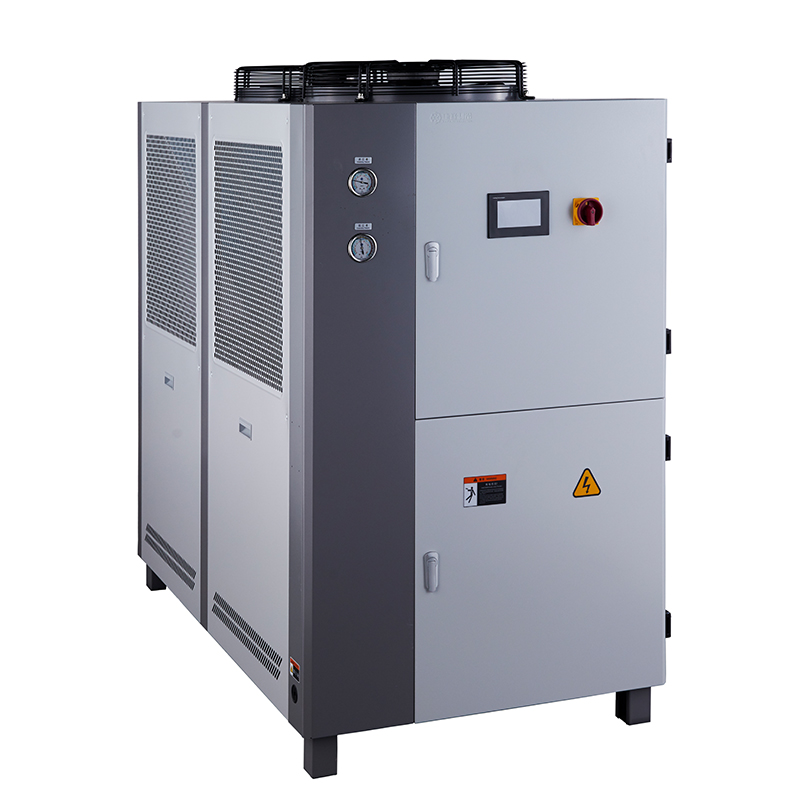The rise of the new energy industry has promoted unparalleled innovation in industrial refrigeration technology. New energy industrial chillers also became a necessary part of high-efficiency thermal management equipment in contemporary production processes. In lithium battery, solar panel, and electric vehicle component production, accurate temperature control becomes a major determinant of product quality and process efficiency, and these are merely fields where this equipment can excel.
This paper will outline the application, advantages and technological advancements of new energy industrial chillers and their use in green industrial processes.

Application of New Energy Industrial Chillers
1. Lithium battery production
Since the main support for the burgeoning energy sector, lithium batteries must be temperature-controlled throughout the entire manufacturing process (e.g., electrode coating, assembling and forming batteries). Temperature is dangerous and may result in battery malfunctioning, battery life reduction, as well as danger.
New energy industrial chillers can offer stable temperature and accurate cooling at key points in the manufacturing process. In optimal thermal conditions, chillers have the ability to improve the performance, lifespan, and safety of batteries, of greatest concern to the rapidly expanding electric vehicle and energy storage sectors.
2. Solar Panel Manufacturing
Solar photovoltaic (PV) cell manufacturing involves high heat in processes such as silicon ingot growing, wafer cutting and module laminating. High heat leads to material warping, inefficiency, and high scrap rate.
Industrial chillers specially made for the energy economies of the future like solar power ensure a reliable supply of cooling, thereby maximizing the life and yield of photovoltaic panels. Their energy conservation and efficiency also make them highly appropriate for the sustainable development philosophy of green energy operators.
3. Cooling of electric vehicle components
Besides battery production, electric vehicle production also includes motor test cooling, power electronics and charging systems. New energy industrial chillers chill these types of components to the appropriate temperature level, without being heated, and also remain stable.
Besides this, new chillers also charge piles for fast charging infrastructure, by reducing the temperature of charging piles, reducing downtime as well as boosting efficiency.
4. Hydrogen Energy System
As the use of clean energy increases, efficient hydrogen fuel cell cooling is a very critical process. Fuel cells produce heat as they are an electrochemical reaction, and therefore, effective thermal management must be used on them.
The new energy industrial chillers provide high cooling capacity in an attempt to achieve the ideal operating temperature, thereby improving the efficiency and life of the fuel cell.
Benefits of the new energy industrial chillers
1. Excellent energy efficiency
Industrial use energy-saving chillers utilize variable frequency technology, variable frequency compressors, and smart control systems in order to have low energy consumption and low cost of operation sustainable development.
2. Accurate temperature control
This chiller, compared to standard cooling equipment, can offer close temperature control (accuracy to ±0.5°C or higher), thereby helping to offer high product quality consistency for precision production processes.
3. Adaptability to the environment
In response to environmentally friendly production worldwide, eco-industrial chillers must utilize environmentally friendly refrigerants such as R-410A or R-32 and be compliant with international environmental standards.
4. Reduce downtime and maintenance
Advanced filtration systems, corrosion-resistant materials and auto-diagnostic features can optimize equipment life and reduce maintenance requirements, especially crucial for high capacity production facilities.
Technological Advances
Recent technological advances in cutting-edge energy industrial chillers include:
- AI predictive maintenance: Analysis of operating data by machine learning algorithms to foretell probable failures beforehand.
- IoT integrated monitoring: Remote real-time monitoring of parameters for energy efficiency optimization and minimization of energy wastage.
- Hybrid cooling system: Integration of air and water cooling technologies to provide operating environments with different climatic conditions.
Conclusion
New energy industrial water chillers are the most critical devices in the new energy industry, which is fast growing in the age of modern manufacturing in today’s era. New energy industrial chillers significantly enhance the efficiency of production, quality and life of the product, covering from lithium batteries, photovoltaic cells to hydrogen fuel cells.
As technology develops, more industrial cooling technologies will become available, further reinforcing the foundation position of new energy industrial water chillers in the future production of clean energy.
By investing in high-performance coolers, not only can operational excellence be achieved by businesses, but also pay an environmental debt – a wave that’s driving the planet towards clean energy.




